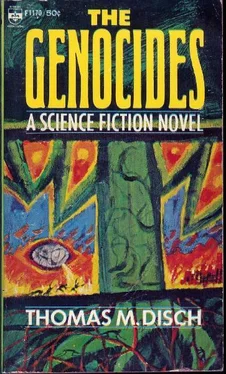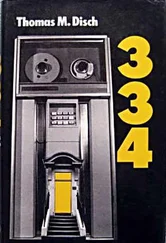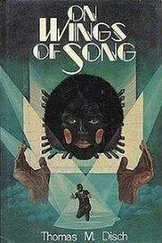But the next time he stumbled, he went headlong into the rough vines of the floor, scratching his face. Rising, he had a dizzy spell and would have fallen again without Orville’s help. Despite himself, he felt a twinge of gratitude for the arm that bore him up. In the darkness, he couldn’t see that Orville was smiling.
Their path wound on down through the root, passing two more intersections such as the one above. Both times Buddy turned left, so that their descent described, approximately, a spiral. The hollow of the root gave no sign of diminishing; if anything it had been growing larger for the last few yards. There was no danger of becoming lost, for the shattering of the root’s lacy interior blazed an unmistakable trail through the labyrinth.
A commotion at the head of the line brought them to a halt. Anderson and Orville pushed their way to the front.
Buddy handed the lamp to his father. “It’s a dead end,” he announced. “We’ll have to go back the way we came.”
The root’s hollow was much enlarged at this point, and the cobwebby stuff filling it more condensed. Instead of shattering glassily under the force of Anderson’s blow, it tore off in handfuls, like rotted fabric. Anderson pressed one of these pieces between his hands. Like the pink candy floss at carnivals or like the airiest kind of white bread, it wadded into a little ball less than an inch round.
“We’ll push our way through,” Anderson announced. He took a step back, then threw his shoulder like a football tackle into the yielding floss. His momentum gave out two and a half yards ahead. Then, because there was nothing solid beneath his feet, he began, slowly, to sink out of sight. Inexorably, under his weight, the candy floss gave way. Buddy stretched his hand forward, and Anderson was able barely to catch hold, fingertips hooked in fingertips. Anderson pulled Buddy into the mire with him. Buddy, falling in a horizontal position, served somewhat as a parachute, and they sank more slowly and came to a stop, safely, some ten feet below.
As they fell, a powerful sweetness, like the odor of rotting fruit, filled the air behind them.
Orville was the first to realize their good fortune. He wadded a mass of the floss to medium density and bit into it. The Plant’s characteristic anise flavor could be discerned, but there was besides a fullness and sweetness, a satisfaction, that was quite new. His tongue recognized it before his mind did and craved another taste. No, not just his tongue—his belly. Every malnourished cell of his body craved more.
“Throw us down the rope,” Anderson shouted hoarsely. He was not hurt, but he was shaken.
Instead of playing out the rope, Orville, with a happy, carefree shout, dove into the flossy mass. As he was swallowed into its darkness, he addressed the old man below: “Your prayers have been answered, sir. You’ve led us across the Red Sea, and now the Lord is feeding us manna. Taste the stuff—taste it! We don’t have to worry about those supplies. This is the reason for the Plants. This is their fruit. This is manna from heaven.”
In the brief stampede over the edge, Mae Stromberg sprained her ankle. Anderson knew better than to pit his authority against raw hunger. He hesitated to eat the fruit himself, for it could be poisonous, but his body’s need strained against an overcautious will. If the rest of them were to be poisoned, he might as well join them.
It tasted good.
Yes , he thought, it must seem like manna to them . And even as the sugary floss condensed on his tongue into droplets of honey, he hated the Plant for seeming so much their friend and their deliverer. For making its poison so delicious.
At his feet the lamp burned unnaturally bright. The floor, though hard enough to hold him up, was not rock-solid. He took out his pocket knife, brushed away the matted floss, and cut a slice of this more solid substance from the fruit. It was crisp, like an Idaho potato, and juicy. It had a blander and less acid taste than the floss. He cut out another piece. He could not stop eating.
Around Anderson, out of range of the lamp, the citizens of Tassel (but was there still a Tassel of which they could be said to be citizens?) snuffled and ate like swine at a trough. Most of them did not bother to press the floss into comfortable mouthfuls but pushed it blindly into their mouths, biting their own fingers and gagging in their greedy haste. Strands of the pulp adhered to their clothes and tangled in their hair. It stuck to the lashes of their closed eyes.
An upright figure advanced into the sphere of lamplight. It was Jeremiah Orville. “I’m sorry,” he said, “if I started all this. I shouldn’t have spoken out of turn. I should have waited for you to say what to do. I wasn’t thinking.”
“That’s all right,” Anderson assured him, his mouth full of half-chewed fruit. “It would have happened the same no matter what you did. Or what I did.”
Orville sat down beside the older man. “In the morning…” he began.
“Morning? It must be morning now.” In fact, they had no way to know. The only working timepieces—an alarm clock and two wristwatches—had been kept in a box in the cornmonroom for safety. No one escaping the fire had thought to rescue the box.
“Well, when everyone’s fed full and they’ve got some sleep—that’s what I meant—then you can set them to work. We’ve lost a battle, but there’s still a war to fight.”
Orville’s tone was politely optimistic, but Anderson found it oppressive. To have come to sanctuary after a disaster did not erase the memory of the disaster. Indeed, Anderson, now that he had stopped running from it, was only just becoming aware of its magnitude. “What work?” he asked, spitting out the rest of the fruit.
“Whatever work you say, sir. Exploring. Clearing out a space down here to live in. Going back to the main root for the supplies we dropped there. Pretty soon, you might even send a scout back to see if anything can be salvaged from the fire.”
Anderson made no reply. Sullenly he recognized that Orville was right. Sullenly he admired his resourcefulness, just as, twenty years earlier, he might have admired an opponent’s fighting style in a brawl at Red Fox Tavern. Though to Anderson’s taste the style was a little too fancy, you had to give the bastard credit for keeping on his feet.
It was strange, but Anderson’s whole body was tensed as though for a fight, as though he had been drinking.
Orville was saying something. “ What’d you say?” Anderson asked in a jeering tone. He hoped it was something that would give him an excuse to smash his face in, the smart punk.
“I said—I’m very sorry about your wife. I can’t understand why she did that. I know how you must be feeling.”
Anderson’s fists unclenched, his jaw grew slack. He felt the pressure of tears behind his eyes, the pressure that had been there all along, but he knew that he could not afford to give in to it. He could not afford the least weakness now.
“Thank you,” he said. Then he cut out another large wedge of the solider, more succulent fruit, split it in two, and gave part to Jeremiah Orville. “You’ve done well tonight,” he said. “I will not forget it.”
Orville left him to whatever thoughts he had and went looking for Blossom. Anderson, alone, thought of his wife with a stony, dumb grief. He could not understand why she had, as he considered it, committed suicide.
He would never know, no one would know, that she had turned back for his sake. He had not yet taken thought of the Bible that had been left behind, and later, when he would, he would regret it no more nor less than Gracie’s death or the hundred other irredeemable losses he had suffered. But Lady had foreseen quite accurately that without that one artifact, in which she herself had had no faith, without the sanction it lent his authority, the old man would be bereft, and that his strength, so long preserved, would soon collapse, like a roof when the timbers have rotted. But she had failed, and her failure would never be understood.
Читать дальше












